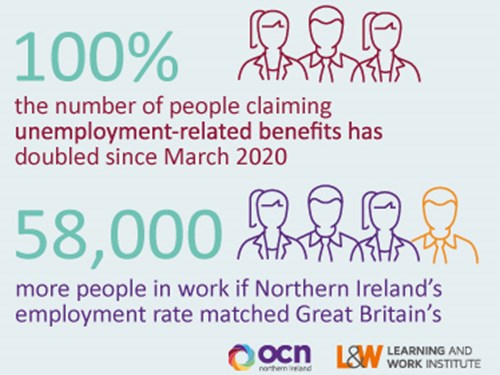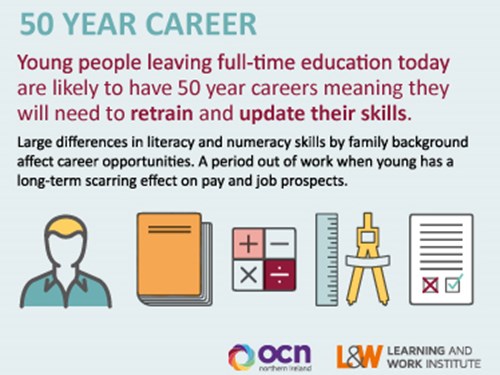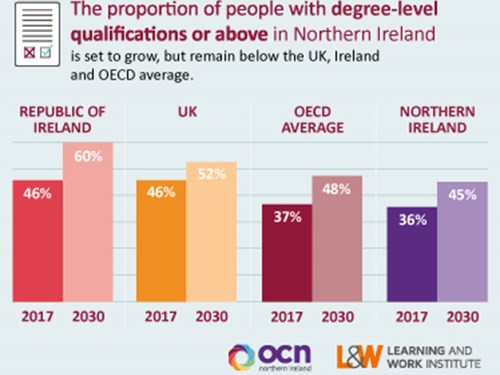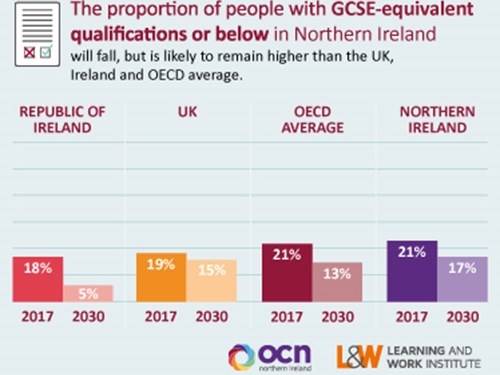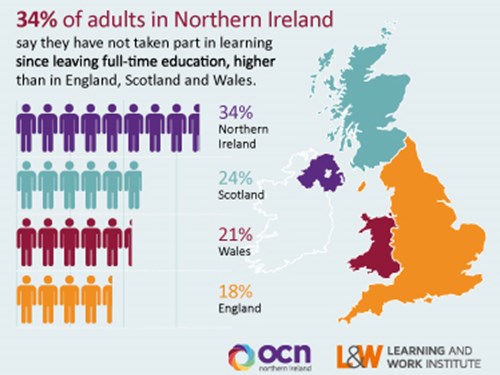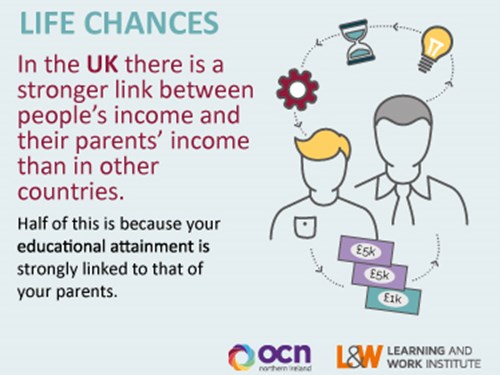A higher skills ambition for Northern Ireland: Skills for growth and social inclusion
 In April 2021 OCN NI signed a Memorandum of Understanding (MoU) with the Learning and Work Institute, an independent policy, research and development organisation dedicated to promoting lifelong learning, full employment and inclusion.
In April 2021 OCN NI signed a Memorandum of Understanding (MoU) with the Learning and Work Institute, an independent policy, research and development organisation dedicated to promoting lifelong learning, full employment and inclusion.
The purpose of this Memorandum of Understanding (MoU) is to confirm the commitment of the two organisations to work together, to positively influence policy makers, funders, and our learning networks on what `A Northern Ireland Learning & Skills Ecosystem` should look like, ultimately benefiting individuals, families communities and the wider NI economy.
A higher skills ambition for Northern Ireland: Skills for growth and social inclusion
| A higher skills ambition for Northern Ireland: Full Report | |
| A higher skills ambition for Northern Ireland: A5 Booklet |
In January 2021, OCN NI commissioned and published a new report from Learning and Work Institute entitled ‘A Higher Skills Ambition for Northern Ireland: Skills for Growth and Social Inclusion.’
The report, from Learning and Work Institute, looks at how the skills of Northern Ireland’s workforce are likely to compare to other countries by 2030. It finds that in 2030 Northern Ireland will have a substantially higher proportion of people qualified below the equivalent of GCSE level than the OECD average (17.4% compared to 12.8%) and a lower proportion with at least a degree-level qualification (44.9% compared to 47.8%).
According to the new report, commissioned by Open College Network NI (OCN NI), by 2030 Northern Ireland will have the fourth highest proportion of low qualified people out of 16 OECD comparators. Moreover, it will be ranked as low as 14th for the proportion of people who are highly qualified. In comparison, the Republic of Ireland would be joint first for the proportion of people with high qualifications and have the joint lowest proportion with low qualifications. Northern Ireland’s skills profile in 2030 will struggle to match the UK’s position today, despite a further ten years to improve skills.
The report calls for the Northern Ireland Executive to set a new higher ambition for skills, backed by investment. It argues for increased investment in learning and skills, making learning a key part of other public services like health, and taking a more joined-up approach with government, employers and individuals working together. The coronavirus crisis has sharpened the need for investment in skills to tackle the big rise in unemployment and help people retrain for new jobs. There should be regular independent reports to keep track of progress and compare this to other countries.
Martin Flynn, OCN NI Chief Executive commented: “This report provides us with a glimpse into what the future may be like, in terms of NI’s skills profile. While the report shows that Northern Ireland’s skills are likely to improve over the next 10 years, we will still remain behind other countries. The report provides the Northern Ireland Executive with an opportunity to set a higher skills ambition in Northern Ireland, which in turn will contribute to improved economic growth, social justice and community cohesion.”
Diane Dodds MLA, Minister for the Economy, said: “Driving forward the skills agenda and providing opportunities for people to learn and upskill has never been more important and remains a key priority for my Department and the Executive. In a rapidly evolving global economy, it is imperative that we use skills to position Northern Ireland and its skilled workforce prominently in the global market. Taking forward this Agenda will be central to my new Skills Strategy.”
Peter Weir MLA, Minister Department of Education said: “I am committed to ensuring that our education system enables our young people to develop the knowledge and skills required to respond to the rapid change that is taking place in the labour market, driven by technological advance and global economic activity. It is crucial that they have the tools to allow them to fulfil their potential. Our curriculum, with a focus on personal capabilities and skills, will help to ensure that our young people are equipped to meet the changing demands of business and the economy.”
Stephen Evans, Chief Executive of Learning and Work Institute, said: “The importance of learning and skills have been heightened by the coronavirus pandemic. Many more people will need help to find work or to retrain. Our report shows that Northern Ireland’s skills are likely to improve, but still lag behind other countries. If we want a prosperous, fair and inclusive Northern Ireland, we need to invest in a higher ambition for learning and skills.”

